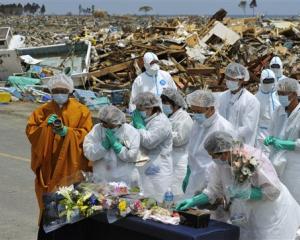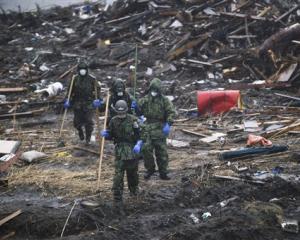A New Zealander who lost her passport in a rush to leave Japan following last week's deadly earthquake and tsunami has had to pay for an emergency replacement.
The Ministry of Foreign Affairs and Trade (MFAT) said yesterday New Zealanders who did not have a pressing need to be in Tokyo and affected provinces should consider leaving, as threats of nuclear fallout from the damaged Fukushima plant continued.
Fane Walter, who was living in the coastal town of Tomioka, 5km from the Fukushima nuclear power plant, told Radio New Zealand the embassy in Japan was not very considerate after she was forced to flee.
"(the) New Zealand Embassy is not being very helpful, I had to pay for my own emergency passport to go home if I wanted to go. Not only that, I would also have to pay for a flight back home and we didn't even know if we were going to get paid this week."
New Zealand Ambassador Ian Kennedy said it was just the way the system worked and the embassy was trying to be as compassionate and warm as possible.
"It does sound tough but we've certainly taken it up and done everything we can....I know that she wasn't happy with it, but we're certainly trying everything we can," he said.
New Zealander Peter Setter, who had not been heard from since the deadly earthquake and tsunami, made contact with his Hawke's Bay family yesterday.
MFAT said it now had no concerns for any New Zealanders in Japan and had no reports of New Zealand injuries or casualties.
Hundreds of thousands of people have lost their homes and at least 13,000 are reported dead after the 9.0-magnitude quake struck on Friday, followed by a massive tsunami that wiped out a number of villages and towns.
MFAT also updated its advice to those living near the Fukushima nuclear power facility, 240km north of Tokyo, increasing the safety zone from the facility.
"As a precautionary measure New Zealanders who live within an 80km radius of the nuclear plant should leave," Foreign Affairs Minister Murray McCully said.
The 80km is farther than Japanese authorities are recommending to their own citizens.
Mr Kennedy said a "handful' of New Zealanders remained in the 80km zone.
The ministry was also looking at whether flights leaving the country were sufficient.
"If we do have a significant number of people looking to fly, are the available flights sufficient, do we need to do something more? All of those matters are on the table," Mr McCully said.








